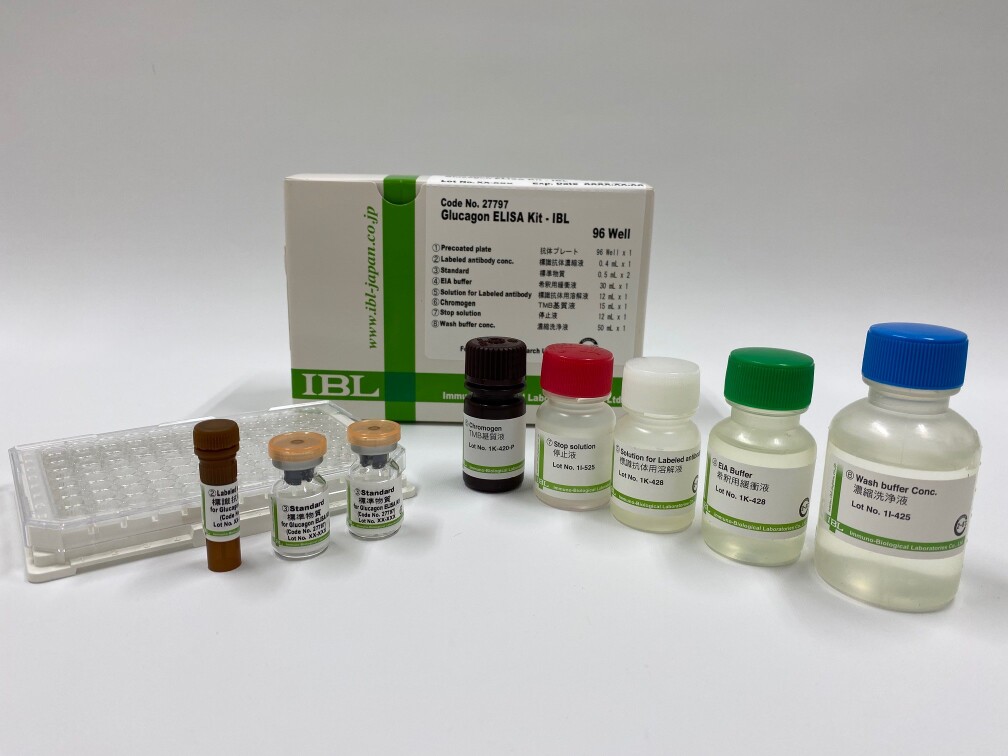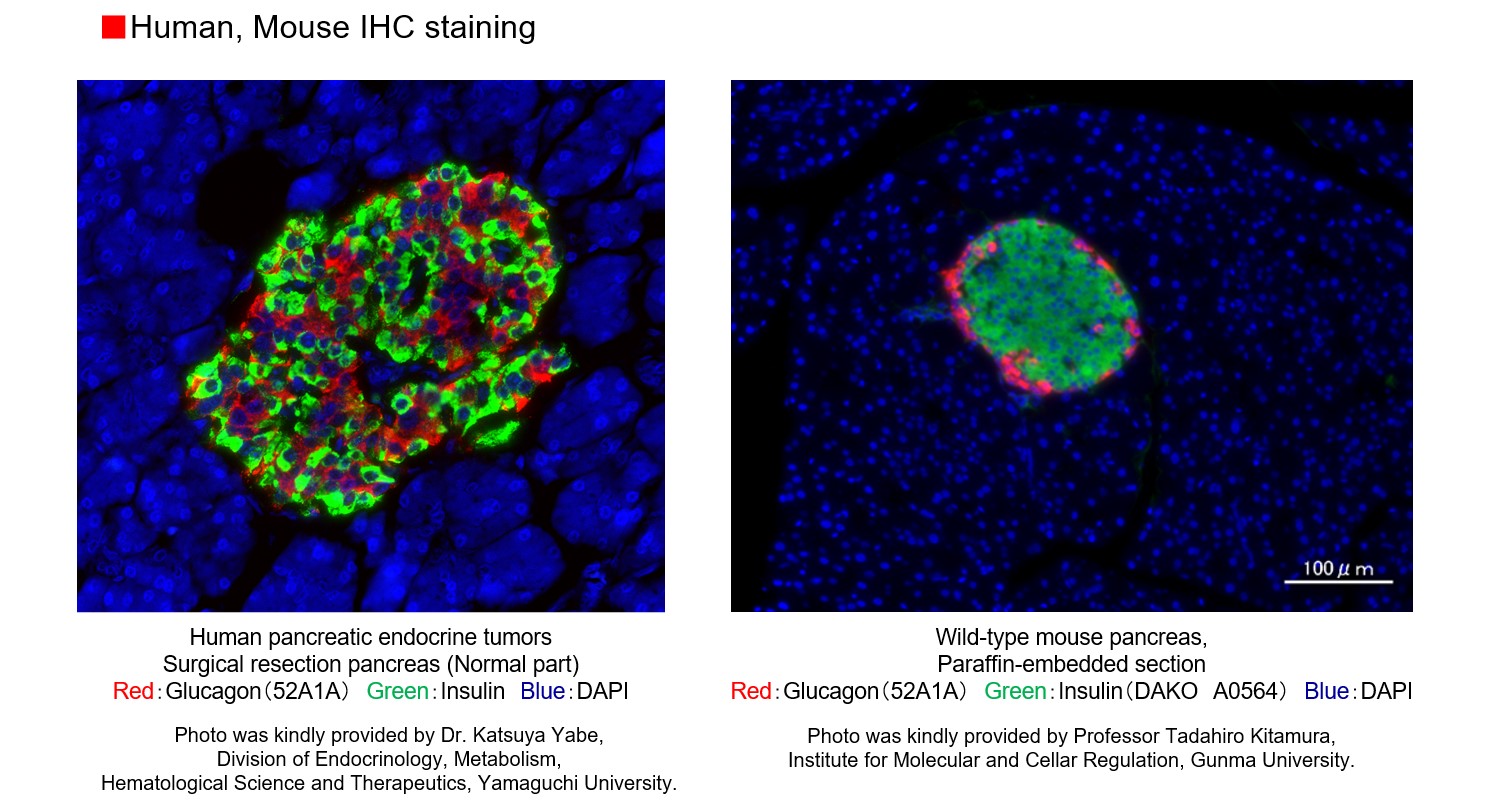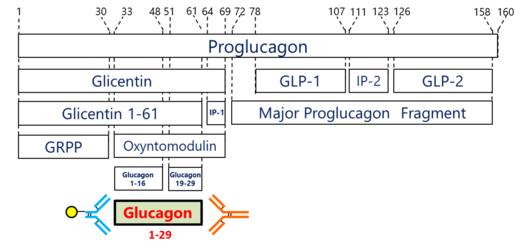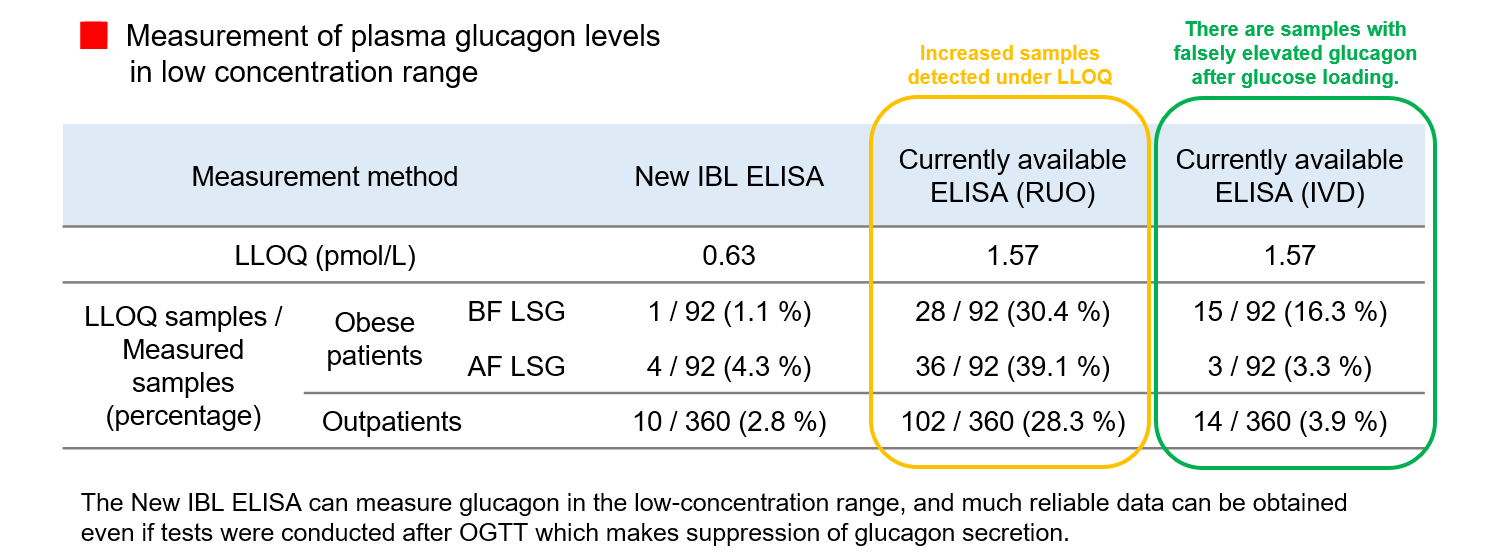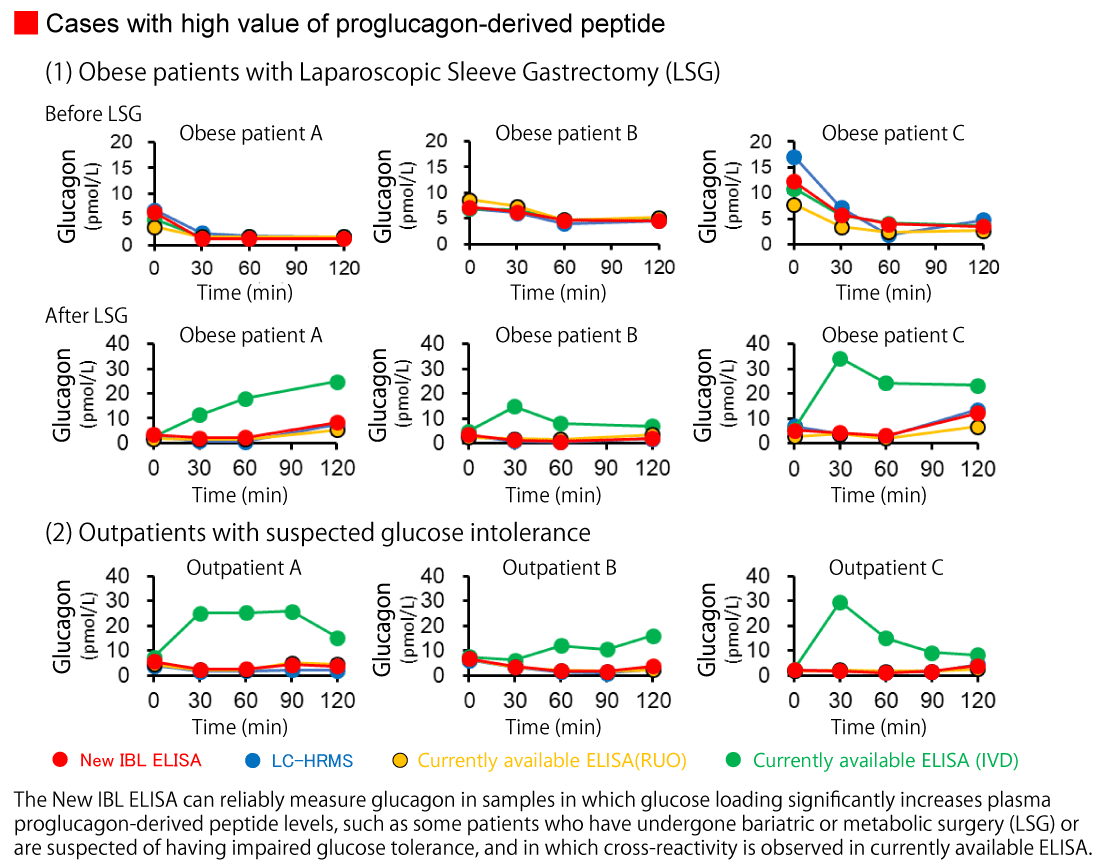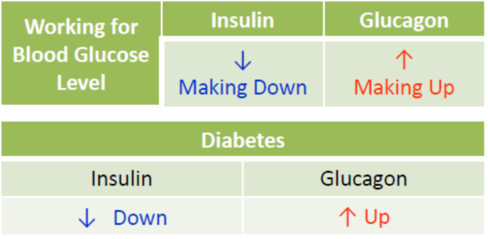Product News
- Product News2023/02/20
- New Release! Highly Specific & Sensitive Glucagon ELISA
Related Materials
 Any IBL product introduced in this IBL news is applicable for research use only and it cannot be used for diagnosis or medical purpose.
Any IBL product introduced in this IBL news is applicable for research use only and it cannot be used for diagnosis or medical purpose.
We are pleased to announce that we newly released highly specific and sensitive Glucagon ELISA. The antibody for IHC is also available for sale.
#27797 Glucagon ELISA Kit - IBL
#10505 Anti-Glucagon (52A1A) Rat IgG MoAb
* Publication *
ELISA
A newly developed glucagon sandwich ELISA is useful for more accurate glucagon evaluation than the currently used sandwich ELISA in subjects with elevated plasma proglucagon-derived peptide levels. M. Kobayashi et al.J Diabetes Investig.2023 Feb 2. PMID: 36729958
Antibody
Honzawa N et al. Protein Kinase C (Pkc)-δ Mediates Arginine-Induced Glucagon Secretion in Pancreatic α-Cells. International Journal of Molecular Sciences. 2022; 23(7):4003.
Please feel free to Contact us
* Features *
Highly Specific
The kit was designed to specifically detect only Glucagon (1-29) binding it by the novel N- and C-terminal specific paired antibodies. It is very important for detecting specific Glucagon (1-29) because it has been reported that some diabetic patients with impaired glucose tolerance have high levels of glicentin (one of glucagon-like hormone) in their blood.
Highly Sensitive
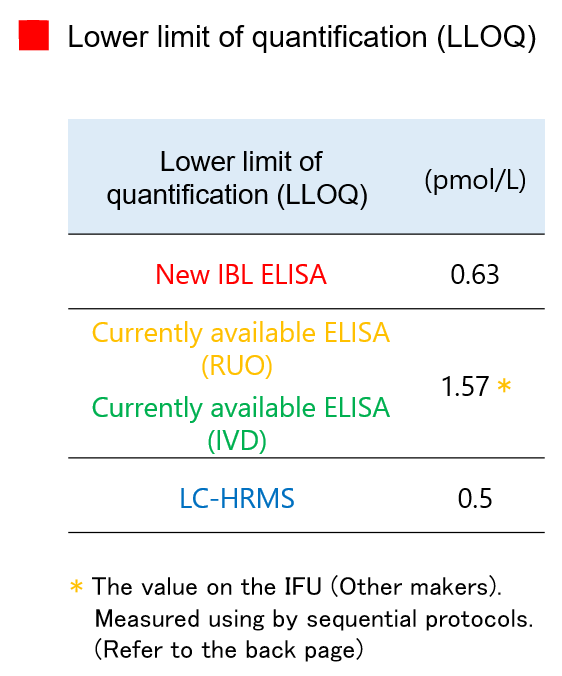
Since it has been reported that glucagon has a variety of physiological functions, the "glucagon-centric theory" has been highlighted in diabetic clinical research past few years. To determine its physiological functions, the hemodynamics of glucagon is required to be analyzed using a variety of loading tests and it has been known that Glucagon blood level is greatly decreased in OGTT (Oral Glucose Tolerance Test). The value might be decreased the point of a few pmol/L level so that the sensitivity is also very important for accurately measuring of glucagon as well as specificity. To fulfill this needs, high specificity and sensitivity are required for the kit development.
The kit is highly sensitive enough to measure even low-concentration samples after glucose loading.
About Products #27797 Glucagon ELISA Kit - IBL
Contact us
* Background of the Development *
IBL-Japan developed the antibodies and ELISA because of market demand (requested by clinical researchers). We took almost 7 years to finaly develop the highly specific paired monoclonal antibodies and the ELISA which only detect Glucagon (1-29) due to the challenge of sharpening the specificity under colalboratively work with clinical research partners.
* Issue of Measuring Glucagon *
It is 100 year anniversary of Glucagon in 2023 since it was discovered, however, Glucagon has not been well clinically studied in past century because of the lack of availability for reliable assays in the market. It is quite difficult for specifically detecting only Glucagon (1-29) because of the producing process of Glucagon.
Glucagon is produced by the processing of its precursor, proglucagon (refer to above diagram). Because of its variety of analogous peptides such as Glicentin or Oxyntomodulin (glucagon like hormone) are produced during this process that why it is so difficult to specifically detect only glucagon.
Glucagon is a peptide hormone with a molecular weight of 3,485 consisting of 29 amino acid residues, secreted by pancreatic alpha cells. It acts on the liver to promote the production and release of glucose through glycogenolysis and glycogenesis, thereby elevating blood glucose.
Insulin and Glucagon
Type 2 Diabetes, which is said to account for 95% of all diabetics, is caused by decreased insulin secretion and insulin resistance. Insulin is a hormone secreted by the beta cells of the pancreas, which lowers blood glucose levels by drawing sugar from the blood into the body. On the other hand, glucagon is a hormone secreted from the alpha cells of the same pancreas and increases blood glucose levels by increasing the production of sugar in the liver.
Insulin and glucagon are considered "antagonistic hormones" because they maintain constant blood glucose levels by balancing each other. However, papers published in 2010 and 2011 suggested that the presence of a certain amount of glucagon, rather than the presence or absence of insulin, may contribute to elevated blood glucose levels, and the "glucagon-centric theory" was published in 2012 by Unger, Cherrington, and colleagues.
Related Products
Please refer to the comprehensive panel biomarkers for glucorce / lipid metabolism.
【GLP-1】
#27700 GLP-1, Active form (High Sensitivity) Assay Kit - IBL
#27784 GLP-1, Active form Assay Kit - IBL
#27788 GLP-1 (9-36/37) Assay Kit - IBL
【GIP】
#27201 Human GIP, Active form Assay Kit - IBL
#27203 Human GIP, Total Assay Kit - IBL
#27701 Mouse GIP, Total (high sensitivity) Assay Kit - IBL
#27702 Mouse GIP, Active form (high sensitivity) Assay Kit - IBL
#27703 Rat GIP, Total (high sensitivity) Assay Kit - IBL
#27704 Rat GIP, Active form (high sensitivity) Assay Kit - IBL
【Insulin】
#27705 Mouse/Rat Total Insulin (high sensitivity) Assay Kit - IBL
#27706 Mouse/Rat Intact Proinsulin Assay Kit - IBL
#27707 Mouse/Rat Total Insulin CLEIA Kit - IBL
#27708 Mouse/Rat Intact Proinsulin CLEIA Kit - IBL
【DPP4】
#27789 Human DPP4 / CD26 Assay Kit - IBL
We look forward to supportinng your research.
Please feel free to contact us.
IBL Brand
LinkedIn
Sales Department
Antibody related Business Division
Immuno-Biological Laboratories Co., Ltd.
Email: do-ibl@ibl-japan.co.jp

